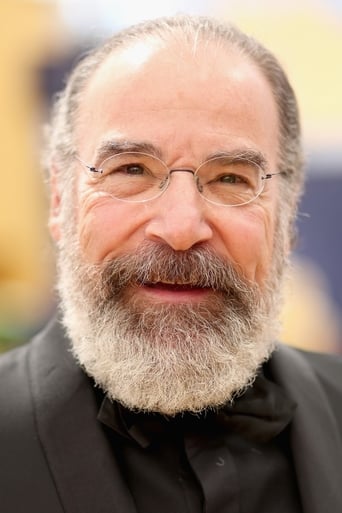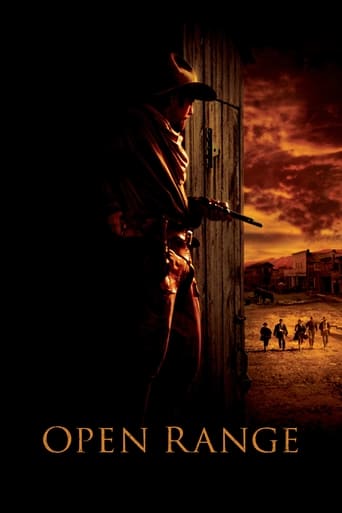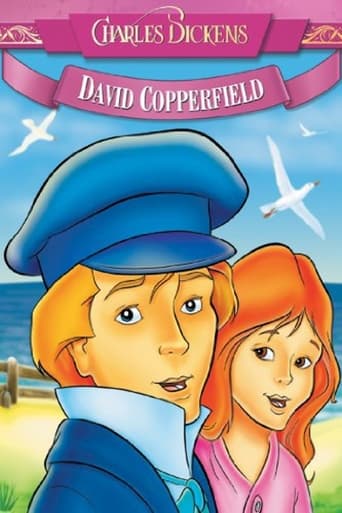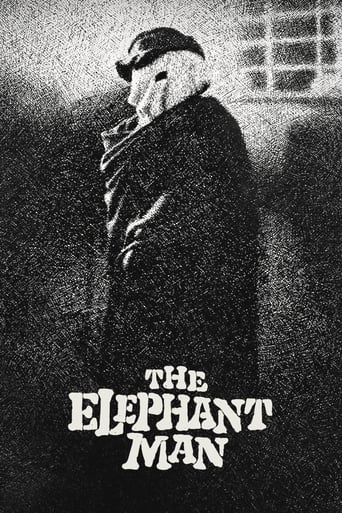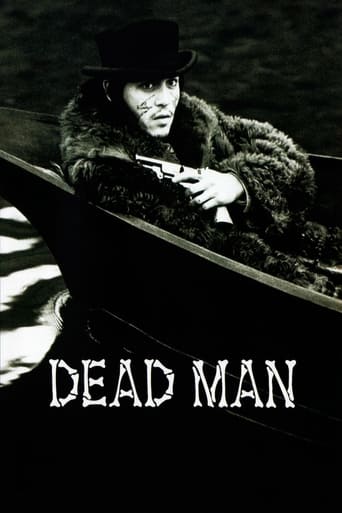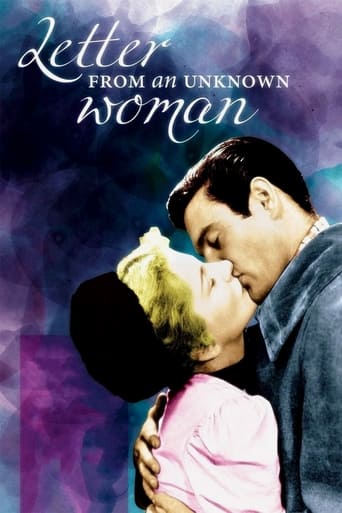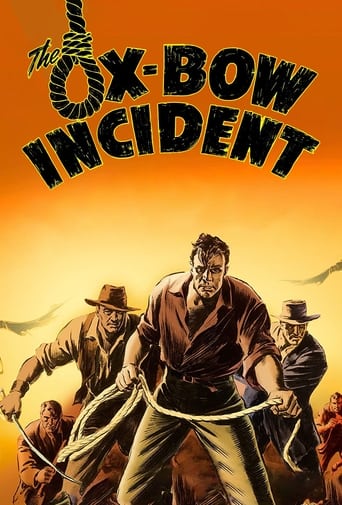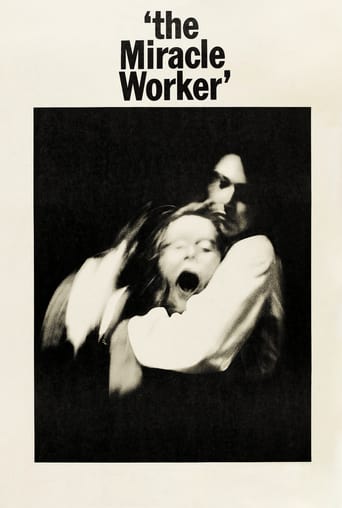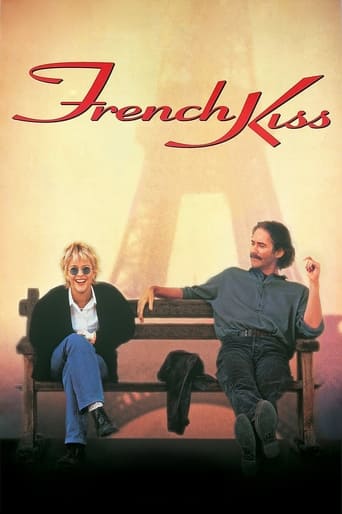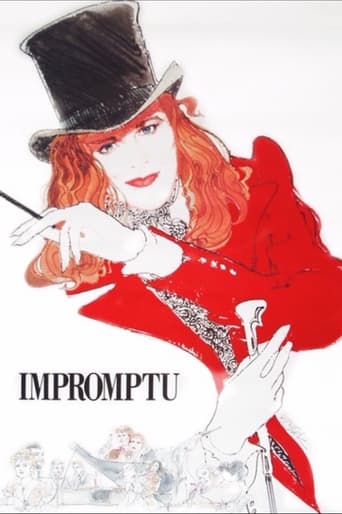
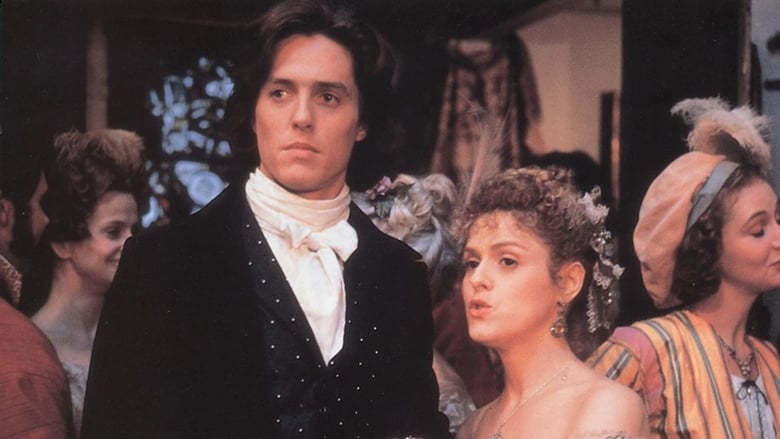
Impromptu (1991)
In 1830s France, pianist/composer Frédéric Chopin is pursued romantically by the determined, individualistic woman who uses the name George Sand.
Watch Trailer
Cast


Similar titles
Reviews
With Hugh Grant playing Frédéric Chopin, Impromptu seems an unlikely film to be, as some critics have called it, the best film ever made based on the notorious writer George Sand and her pursuit of the Polish-French composer whose attitude toward amour frustrated the daylights out of her. Grant plays Chopin as a handsome but delicate soul, and Judy Davis turns in another magnificent performance as the hyper-aggressive Sand. Grant's Polish accent is endearing; even if it is not quite identifiable; so what, they were speaking French anyway. Emma Thompson is a hoot as the social climber who plays host to Chopin, Sand, and Franz Liszt while her husband calls them a bunch of parasites. It's a very entertaining romp, with lovely scenery, witty lines, and lots of temperament. References to Chopin's Polishness are sprinkled lightly throughout.
It can be a disconcerting experience watching determined feminist George Sand pursuing such an insecure object of desire after the freethinking French author goes weak in the knees for the heavenly music of young Frederick Chopin. Judy Davis gets plenty of mileage out of Sand's confident iconoclasm (ignoring the low moment when she tries to win the composer's attention by exchanging her trademark trousers for a lacy dress patterned after the Polish flag), and her lively performance goes a long way toward overcoming the inadequacies of a script that is less witty than it would have us believe. For everyone else in the cast it's simply a costume party, and director James Lapine leaves them free to indulge in some shameless overacting (Emma Thompson, in particular, gives a rare irritating performance). The whole thing doesn't amount to anything more than a shallow, highbrow romantic comedy, but at least the music is good, and if nothing else the film helped support the costume design industry for several weeks.
Impromptu (1991),a very enjoyable period romance/biotic/dramedy based on the real events, portrays truly famous and even legendary figures of 19th Century culture such as George Sand, nee Aurora Dupin, Frederick Chopin, Franz Listz, Eugene Delacroix, and Alfred De Musset. The main heroine (or the hero) of the film is George Sand, who is equally known for her Romantic novels and her quite scandalous at the time way of life. For a young woman from the upper-class society, to leave her husband, take two children with her, make a living with her writing, and especially to show up in public wearing men clothing and openly smocking - it was shocking. To act like a man when it comes to love affairs - taking lovers when she felt like it and leaving them when the affair bored her was simply outrageous by the rules of the society. George Sand did not care; she had a strong personality and followed her own rules. Her contemporary, the Russian ex-patriot, famous novelist Ivan Turgenev said about her "What a brave man she was, and what a good woman." That's exactly who Judy Davis is playing in the little known but witty, intelligent, charmingly silly and believe it or not historically accurate movie called "Impromptu". It tells the story of the romance between strong and full of life George Sand and very talented romantic composer, Frederic Chopin whose music made her fall in love with him even before they met in person. It is difficult to imagine together two people more different than a delicate fragile Chopin who died young at the age of 39 from the lung illness and fiercely independent, notorious and unorthodox George/Aurora but their romance which was the union of two lovers, close friends, and eventually more like mother - son relationship is the historical fact. Hugh Grant in one of his earlier roles as young Polish composer and virtuoso piano-player is refined, well-mannered and very attractive. Actually all cast of the movie is delightful, Mandy Patinkin (Alfred de Musset), Jules Sands (Franz Listz), Bernadette Peters (Countess D'Agout, Listz lover, muse, and mother of his children who believed she could be even better muse for Chopin), and fabulous Emma Thompson who brought much appreciated comedy as Duchess D'Antan, rich aristocrat who sees herself as a patron of Art and the friend of the Artists. What the artists think of her is the different story.Needless to say that the film is filled with the captivating music, charming costumes, and gorgeous locations. It is a hidden treasure and I am glad to have finally discovered it.
Sometimes you just like a movie. I admit I was prepared to like this. It features Chopin, and he is a large part of my musical world. His stuff really is magical, but only when flowing through a rich vessel. The things he wrote when he was with Sands are a touchstone of sorts for sustained passion, the kind that roots you to air.And. And it has Judy. She seems to have made some very bad choices in projects, a situation I cannot understand. But when she's tuned in, she gives echoes of just the sort of passion I hear from Frederic. She's tuned in here, despite the ordinary direction. Her character is close to the one that initially impressed me, in her brilliant career. Judy is capable of folded acting, giving us emotion directly from a character and at the same time standing as the writer (here, the writer) reporting that emotion and the immediate context to us. It seems to have been perfected by Australian actresses.Plus, we have Emma Thompson. She's so early in her career she wasn't billed so that I could find, so she was a real surprise. She inserts an Austen-derived character, a brunette, moneyed dope wishing to become sharper by rubbing against artists. The script is ordinary, riskless, surprisingly so. But it has one clever moment when the artists assembled in her country home give a play that makes serious fun of their hosts. Two other joys; the men playing Chopin and Liszt actually do play the piano. And finally, through the whole thing we hear Chopin pieces. They aren't performed by passionate, controlled pianists, but any Chopin in a film is welcome stuff. I think on my film site, I'll have a list of films that have Chopin pieces as central. You'll be surprised how many there are. "Five Easy Pieces" and "Autumn Sonata" are the obvious ones.All this, plus a nice opening scene of our writer as a redheaded girl, are enough to give you pleasure. It almost helps that the direction and story are lifeless. They don't challenge. Its as if we had Chopin perform for us, giving us the harvest of his pain and none of the pain itself.Hugh Grant is wrong for Chopin, but apt for the placeholder named Chopin in this film. He has only one good scene, where he worries over an impromptu that seems contrived. It should reflect spontaneity, he thinks. It isn't that it needs to be actually spontaneous, but that it be crafted in such a way that gives that impression. What is the impression of spontaneity? If you have a chance, check out Martha Argerich, in her 1965 recording. You want overflowing passion that seems always on the edge of falling but is shaped smoothly? You will never be the same. Thank George Sand, I think.The one really dire problem is that they used his piano music without regard to whether it would have been then written.Ted's Evaluation -- 3 of 3: Worth watching.




